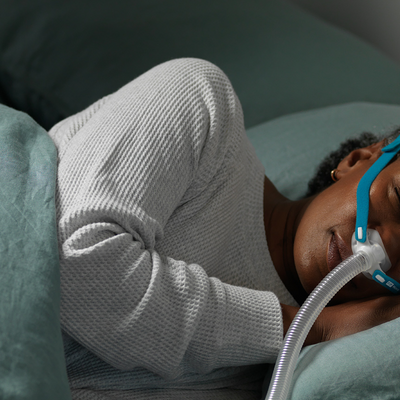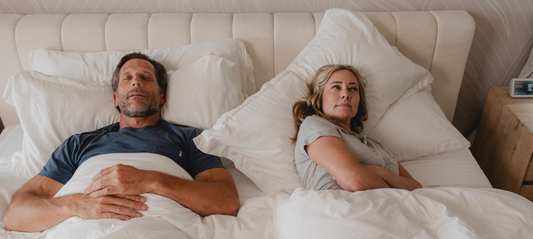How Sleep Affects Blood Sugar
Sleep quality can affect everything from your energy levels to your risk of obesity, diabetes, and overall health, including blood sugar regulation. It’s important to understand the connection between sleep, blood sugar, and conditions like sleep apnea, in order to be your healthiest self.
The Connection Between Sleep and Blood Sugar Regulation
Blood sugar, or glucose, provides energy to your body, while insulin is the hormone that keeps your blood sugar in check. When you sleep, blood sugar levels naturally fluctuate, peaking around early morning.
If you have healthy insulin function, these fluctuations are manageable. But low-quality sleep can cause an imbalance of your sleep hormones, affecting your insulin sensitivity. This can lead to an increased risk of diabetes and worsening existing blood sugar problems.
Studies show that getting less than 6 hours of sleep can harm how your body handles sugar, increasing the risk of type 2 diabetes and other metabolic problems. People with type 2 diabetes often struggle with sleep issues like obstructive sleep apnea, which can make their blood sugar and overall health worse.
How Sleep Apnea Affects Blood Sugar
Sleep apnea, a condition where breathing repeatedly stops and starts during sleep, can make it harder to regular blood sugar. Each pause in breathing causes a surge in stress hormones like cortisol, which can interfere with your body’s sleep hormones. Understandably, fragmented sleep caused by this condition makes it harder to get quality sleep and affects your body’s ability to regulate blood sugar.
Do you have sleep apnea? If you struggle with snoring, fatigue, brain fog, dry mouth, or headaches, we highly recommend you get tested for sleep apnea. Managing your sleep apnea with CPAP therapy can help lower your disease risk and other conditions.
How Blood Sugar Affects Overall Health
Most people know imbalanced blood sugar is linked to diabetes. But high blood sugar can also harm other areas of health, including your:
-
Cardiovascular System: High blood sugar can damage blood vessels, increasing the risk of heart disease and stroke.
-
Kidneys: Over time, excess glucose can strain your kidneys and lead to disease.
-
Nervous System: This can affect your mobility and sensation.
Healthy blood sugar levels are essential for reducing these risks and improving energy levels, cognitive function, and overall well-being.
4 Tips to Support Healthy Blood Sugar Through Sleep
The good news is that improving your sleep habits can significantly impact your blood sugar. Here are some tips:
-
Aim for 7-9 Hours of Sleep: Consistency is key to maintaining balanced blood sugar levels.
-
Stick to a Routine: Go to bed and wake up at the same time each day, even on weekends.
-
Get Exercise: Physical activity helps your body use insulin more efficiently. Even just a post-dinner walk can work wonders.
-
Avoid Late-Night Snacks: Eating close to bedtime can disrupt your body’s natural processes, including blood sugar regulation.
Foods That Promote Better Sleep and Balanced Blood Sugar
Your diet plays a key role in both sleep quality and blood sugar regulation. Diet also supports a healthy gut, which impacts hormone balance. Consider adding these nutritious foods into your diet:
-
Spinach, almonds, and bananas are all rich in magnesium, which helps relax your muscles and support deep sleep.
-
Turkey, eggs, and yogurt have tryptophan, which helps produce serotonin and melatonin for restful sleep.
-
Fermented foods like yogurt or kefir improve gut health, which can improve sleep and regulate blood sugar.
-
Whole grains and sweet potatoes are complex carbs that help give you steady energy and prevent overnight glucose spikes.
Foods to Avoid Before Bedtime
To protect sleep and blood sugar, avoid sugary snacks and caffeine late in the day, as these disrupt both gut health and natural sleep cycles.
Let Us Help Improve Your Sleep!
If sleep apnea affects your rest, addressing it can make a world of difference for your blood sugar and overall health. At Lofta, we offer you expert support through your sleep apnea journey, from diagnosis to treatment.
-
At-Home Sleep Tests: Our convenient and easy-to-use test is shipped straight to your door. The device is worn on your hand, and you receive your diagnosis and treatment options entirely through our remote system.
-
CPAP Therapy Solutions: We offer an extensive range of CPAP products, including best-sellers like the ResMed AirMini, to ensure you unlock the best sleep possible.
-
Expert Guidance: Our Lofta Care Team is here to guide you every step of the way. From answering your questions about sleep apnea to helping you choose the right CPAP equipment, our team of sleep experts provides personalized support tailored to your needs.
When you invest in better sleep, you’re also working toward improved blood sugar management and a healthier future. As we’ve discussed, sleep and blood sugar are deeply interconnected.
Poor sleep habits and untreated sleep apnea can lead to serious health risks. Fortunately, there’s an easy solution! With improved sleep hygiene and the right tools from our team here at Lofta, you can take control of your health!










































